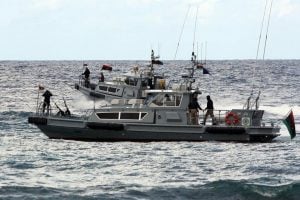By Libya Herald reporters.

Tripoli, 13 August 2017:
The Italian government has today praised the Presidency Council (PC)’s order for all foreign vessels to stay out of Libyan territorial waters from near to or within which charities have this year been picking up the majority of migrants.
Italian foreign minister Angelino Alfano echoed prime minister Paolo Gentiloni’s call for a halt to the migrant flows. Libya people-traffickers have so far this year sent more than 95,000 migrants to sea in overcrowded inflatable rafts or decrepit fishing boats. Italy wants migrants to be held and processed in camps in Libya, a scheme which the PC has thus far rejected.
“We need a significant, I repeat, a significant European economic investment in Libya and in Africa,” AFP reported Alfano as saying. The foreign mnister also told La Stampa today that Libya was ready to work with the EU and invest in its coastguards. “This sends a signal that the balance is being restored in the Mediterranean” he said.
The Libyan closure of its territorial waters has caused most of the seven charities principally involved in migrant rescues, led by Medecins Sans Frontieres on Thursday, to announce that they were suspending their operations.
The PC has said that Libyan coastguard vessels will patrol “a rescue zone” and deal with migrants. It is unclear if this zone encompasses all or just part of Libya’s 12-mile limit. There has been a number of confrontations between charity rescue ships and well-armed and equipped vessels that appeared to belong to the Libyan Coastguard. In one incident last year a rescue ship was driven off by gunfire, armed men boarded a crowded inflatable apparently to seize the outboard motor but the craft was punctured and keeled over drowning at least 20 migrants.
This January Italy began training a second draft of Libyan Coastguards. In Rome last month, Gentiloni told PC head Faiez Serraj that he was also prepared to up material support for the Coastguard.
He also said after their meeting that Serraj had agreed that Italian warships could operate against migrant smugglers inside Libyan waters. This was later denied by Serraj and the idea widely attacked, not least in the east where armed forces commander-in-chief Khalifa Hafter warned that it would be a violation of Libyan sovereignty.







